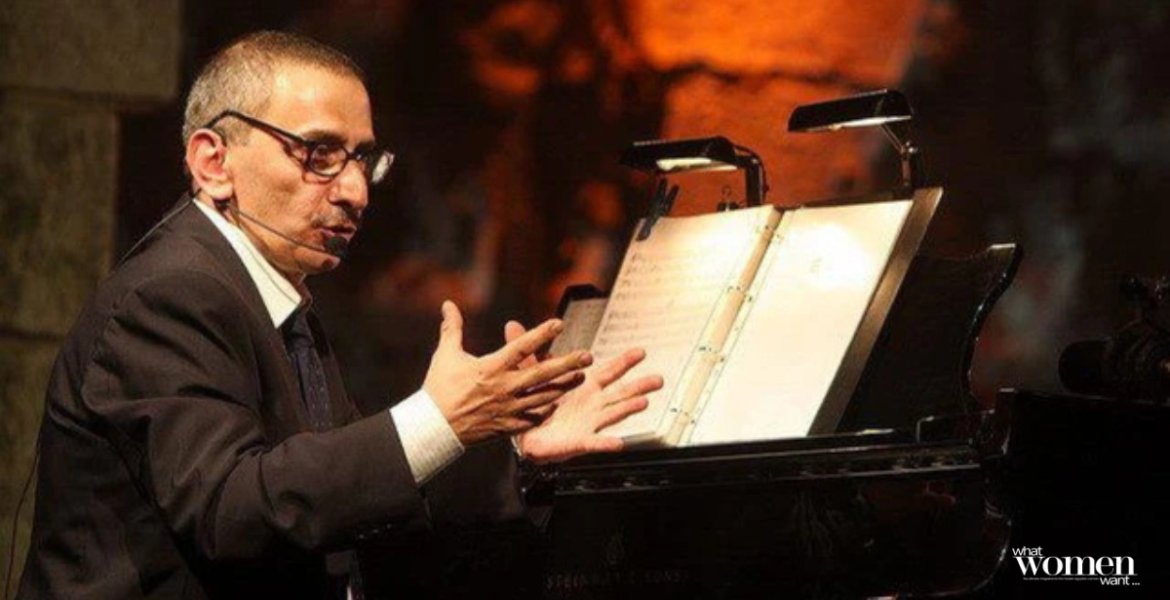Ziad Rahbani was one of the most celebrated Lebanese artists, marking a pivotal era in Lebanon’s history. He was a greatly talented composer, pianist, playwright, writer, and political commentator. His music, lyrics, and plays are prominent in Lebanese culture and around the entire Arab world.
Ziad Rahbani passed away on July 27, 2025, leaving many with heavy hearts and tear-filled eyes. He left behind a legacy to be remembered forever in the Arab world through his music, lyrics, writings, and plays. On the day of his passing, the Arab world was filled with grief and sorrow. In Lebanon, people paid tribute in the streets and at the funeral, standing around with flowers in their hands.
His Upbringing
Ziad Rahbani is the son of two great pillars in the world of music, the renowned singer, Fayrouz, and the famous music composer and producer, Assi Rahbani. Rahbani played a significant role in redefining Arab music. He was called a musical prodigy since he was young, and promised to take over the Rahbani brothers’ music business.
Ziad Rahbani was born on January 1, 1956. Growing up in one of the most famous families in the music industry, which transformed the music scene in Lebanon. Music was an integral part of Ziad Rahbani’s life. He was exposed to the art of making music from a young age. His father, Assi Rahbani, and his uncle, Mansour Rahbani, produced music, films, and theatre plays. They produced many of his mother’s albums, Fayrouz.
This powered Ziad Rahbani’s childhood with a creative atmosphere shaped by his family’s artistic legacy. This environment helped him explore his artistic expression through writing and composing his music from a young age. He achieved his own, distinct style of composition. Ziad Rahbani’s first known work, “Sadiqi Allah,” is a poetry collection of spiritual writings, impressively written in his teenage years.
His Musical Journey
His artistic vision shone through his skills playing multiple instruments like the piano, electronic keyboard, accordion, and the buzuq, a prominent instrument used in Syrian and Lebanese music. Ziad Rahbani first major recognition came with his debut composition for his mother, beloved Fayrouz, in her iconic 1971 song “Sa’alouni El Nass.” Rahbani wrote the piece at just 15 years old.
In 1979, Ziad Rahbani officially became Fayrouz’s chief composer, modernizing her songs. Breaking away from the Rahbani Brothers’ signature use of formal Arabic language, Ziad introduced Lebanese dialect and street slang into Fayrouz’s lyrics. His distinct musical style further modernized her sound, helping her revive her popularity, expanding her songs beyond the traditional Rahabani style that defined her earlier works.
Together, they created Fayrouz’s most celebrated songs and albums we all know and love. Ziad composed the lyrics and music for some of Fayrouz’s unforgettable tracks “Kifak Inta” and “Sallimleh Alayh”, along with her well-known albums, “Maarifti feek”, “Wahdon”, and “Al Bosta.”
His Influence on Arabic Music
Ziad Rahbani’s unique and vibrant musical style infused Western jazz, funk, and classical music with Arabic melodies, calling it “Oriental jazz.” Although he wasn’t the first person to use this phrase, he carried it out well. As he once said, “I admire the music of composers like Charlie Parker, Stan Getz and Dizzy Gillespie, but my music is not Western, it’s Lebanese, with a different way of expression.” His musical style reflected the hybrid culture of Lebanon.
This musical style influenced the Arab music scene significantly. He added new sounds to Arabic music, added a more intimate touch to Arabic songs, and revived Fayrouz’s musical career. One of his most famous compositions is his music and songs used in his famous theatrical piece “Film Ameriki Tawil”. Moreover, his most listened to song is the romantic and heartfelt song “Bala Wala Chi” in his most famous album “Houdou Nisbi”, reaffirming the intimate and romantic style he was incorporating in his music and lyrics. Ziad Rahbani left the Arab world a legacy of music and art; we will cherish it forever.

